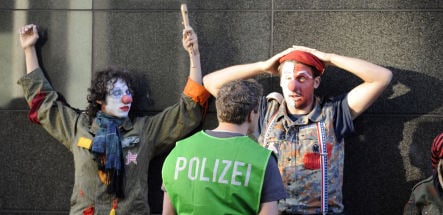The demonstrators were arrested for throwing paint, repeatedly trying to interrupt the ceremony with a bull horn and resisting law enforcement officers who tried to confiscate the loud speaker, police said. Several demonstrators were injured, and the bull horn was damaged in the incident. Some protestors from the Gelöbnix organization have accused police of using excessive force and storming their vehicles. Police have denied the accusations.
Among those arrested was former Red Army Faction (RAF) terrorist group member Inge Vieth, a police spokesperson said. The 64-year-old leftist escaped prison several times in the 1970s and in 1983 disappeared into the communist East Germany where she was discovered in 1990 after The Wall fell. In 1992 she was sentenced to 13 years in prison for the attempted murder of a French police officer, but received an early parole in 1997.
The controversial ceremony had set the country’s top politicians into a whirl of indecision as to whether they would attend, with Chancellor Angela Merkel and Foreign Minister Frank-Walter Steinmeier only deciding to attend at the last minute.
The ceremonial swearing in of new recruits is controversial despite being conducted each year on July 20, marking the date of the failed 1944 Stauffenberg bomb plot to kill Adolf Hitler.
This date is designed to remind soldiers – and the public – that they are swearing loyalty to the country, the law and freedom rather than to a person.
Hitler had demanded that soldiers swore a personal oath of loyalty to him specifically.
Pacifists often try to interrupt the ceremony, often by running through the ranks of soldiers naked, since it was first held in 1999 – also the first year that Germany broke with the post-war convention of not sending armed forces into combat.
This year, with soldiers in active service in Afghanistan, and the ceremony being held in front of the Reichstag, the authorities mustered 1,800 police officers to keep demonstrators and potential disruptions well away.
Some 1,000 guests attended the ceremony. Former Chancellor Helmut Schmidt made a speech and Defence Minister Franz Joseph Jung was also present.
The last-minute confirmation that Merkel and Steinmeier would attend the event came after former general inspector of the army Klaus Naumann sharply criticized them for planning not to go.
He said the point of staging the ceremony in front of the Reichstag was to make the point that the army is controlled by a democratic parliament which should publicly accept this responsibility.
ddp/dpa




 Please whitelist us to continue reading.
Please whitelist us to continue reading.